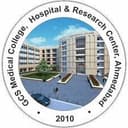Bachelor of Physiotherapy (BPT)
OR
Prepared by Docthub Courses Team ∣
Last updated on 18 Jul 2024
Overview
BPT is a full-time undergraduate program that focuses on the study of physiotherapy and rehabilitation. It is a 4.5-year course designed to train students in the field of physical therapy and health promotion. Physiotherapy involves the use of various techniques to restore and enhance the physical functionality and mobility of individuals.
The BPT program encompasses theoretical knowledge and practical skills required for assessing, diagnosing, and treating a wide range of physical conditions and injuries. It draws from scientific principles and evidence-based practices to develop effective treatment plans for patients.
During the course, students also engage in a 1-year internship to gain hands-on experience and refine their skills. This internship provides them with opportunities to work in various clinical settings under the supervision of experienced physiotherapists. They learn different types of physiotherapy treatments, including therapeutic exercises, manual therapy, electrotherapy, hydrotherapy, and more.

Table of Content
What is BPT?
Bachelor of Physiotherapy (BPT) is an undergraduate program that focuses on the human body's structure. The course typically lasts for four years, followed by a six-month internship.
Physiotherapy involves using physical forces like heat, electricity, and mechanical pressure to treat various conditions. It aims to maintain and restore optimal movement and functional ability throughout a person's life.
Physiotherapists possess in-depth knowledge of human anatomy, including bones, muscles, and nerves, allowing them to provide effective treatments.
BPT Course Details
| Course Name | Bachelor of Physiotherapy |
| Commonly known as | BPT course |
| Course Level | Undergraduate |
| Course type | Degree program |
| Course duration | 4.5 Year (4-year Theory and 6 months Internship) |
| Minimum qualification | 10+2 Science with Physics, Chemistry, Biology (PCB) |
BPT Eligibility Criteria
To be eligible for admission into the Bachelor of Physiotherapy (BPT) program, candidates need to fulfill specific conditions and requirements set by the respective institutes. It's important to note that eligibility criteria may vary among different institutes. Here is a summary of the common eligibility criteria for BPT:
- Educational Qualifications: Candidates should have completed their 10+2 education from a recognized institute with a minimum of 50% marks.
- Compulsory Subjects: Candidates must have studied Physics, Chemistry, and Biology as compulsory subjects during their 10+2 education.
- Proficiency in English: Candidates should have passed the English language subject.
- Age Requirement: Candidates should have attained the age of 17 years at the time of admission.
BPT Course Duration
The Bachelor of Physiotherapy (BPT) course in India generally has a duration of 4.5 years, which includes both 4 years of academic study and 6 months of internship.
During the academic study phase, students learn various aspects of physiotherapy, including different treatment techniques, assessment methods, and therapeutic exercises. They learn about human anatomy, physiology, and the principles of physiotherapy.
An internship is an integral part of the BPT program, where students get hands-on experience in applying physiotherapy techniques and treatments.
Who should do BPT?
The Bachelor of Physiotherapy (BPT) course is suitable for individuals who have a strong interest in healthcare, human movement, and rehabilitation. Here are some groups of people who might consider pursuing a BPT course:
- Individuals Interested in Healthcare: If you have a genuine interest in healthcare and a passion for helping others improve their physical well-being, the BPT course can be an excellent choice. BPT equips you with the knowledge and skills to provide effective physiotherapy treatments and contribute to the overall health of individuals.
- Science and Anatomy Enthusiasts: If you are fascinated by the intricacies of the human body, its anatomy, and physiology, pursuing a BPT course can provide you with in-depth knowledge about the musculoskeletal system, nervous system, and various body functions. You will have the opportunity to study human anatomy in detail and understand how it relates to physical health and movement.
- Individuals Interested in Rehabilitation and Sports: BPT is closely associated with rehabilitation, sports medicine, and injury prevention. If you have an interest in helping individuals recover from injuries, improve their mobility, or enhance their athletic performance, the BPT course can provide you with the necessary skills and expertise.
- Compassionate and Empathetic Individuals: BPT professionals work closely with patients who may be experiencing pain, physical limitations, or disabilities. If you possess compassion, empathy, and a desire to make a positive impact on people's lives, a career in physiotherapy can be fulfilling.
- Strong Communication and Interpersonal Skills: BPT professionals need to effectively communicate with patients, understand their needs, and educate them about their conditions and treatment plans. If you have good communication skills, enjoy working with people, and can build rapport easily, BPT can be a suitable career path.
- Analytical and Problem-Solving Oriented Individuals: BPT requires critical thinking and problem-solving skills to assess patient conditions, develop personalized treatment plans, and monitor progress. If you enjoy analyzing complex situations and finding solutions, the BPT course can provide opportunities for growth and challenge.
Why study BPT?
Studying the Bachelor of Physiotherapy (BPT) course offers several compelling reasons:
- High Demand: There is a significant demand for physiotherapists in India. Patients recovering from surgeries and accidents, and those with chronic conditions like arthritis seek their services. This demand is expected to grow further, driven by increasing awareness of health and fitness and an associated rise in sports injuries.
- Diverse Career Opportunities: BPT graduates have a range of career options. They can work as sports physiotherapists, osteopaths, or consultants. The field of physiotherapy allows for specialization and the incorporation of complementary and alternative medicine into practice.
- Hands-on Learning: The BPT course provides an opportunity to learn about human anatomy while gaining practical experience in physiotherapy. Students develop skills in using their hands to provide treatments and therapies, applying their knowledge directly to help patients.
- Lucrative Salaries: BPT graduates can earn attractive salaries, with the average range falling between INR 3,50,000 to INR 7,00,000 per year. This indicates the value and demand for qualified physiotherapists in the healthcare industry.
- Fulfilling Social Contribution: By studying BPT, individuals can enter a field that involves making a positive impact on people's lives. Helping patients recover from injuries, regain mobility, and manage chronic conditions contributes to their overall well-being and quality of life.
- Addressing the Shortfall: India currently faces a shortage of approximately 90,000+ physiotherapists, according to WHO standards. This shortage is expected to persist and increase in the future. Thus, pursuing BPT offers an opportunity to meet this demand and fill the gap in healthcare services.
Overall, studying BPT provides a rewarding career path, with ample opportunities for professional growth, financial stability, and the satisfaction of serving the community's healthcare needs.
BPT Entrance Exam
In India, various entrance exams are conducted for admission to the Bachelor of Physiotherapy (BPT) course in different universities and colleges. Here are some common entrance exams for BPT:
| Entrance Exam Name | Full Name | Conducted by |
| NEET | National Eligibility cum Entrance Test | National Testing Agency |
| AIIMS BPT Entrance Exam | All India Institute of Medical Sciences BPT Entrance Exam | All India Institute of Medical Sciences (AIIMS) |
| CET | Common Entrance Test | Various states and universities |
| State-level Entrance Exams | State-level BPT Entrance Exams | Respective state authorities |
| University-specific Entrance Exams | University-specific BPT Entrance Exams | Respective universities or colleges |
BPT Admission Process
- Meet the eligibility criteria, which typically includes completing 10+2 education with Physics, Chemistry, and Biology as compulsory subjects and obtaining a minimum percentage of marks (usually around 50% or higher).
- Appear for entrance exams at the national, state, or university level, such as NEET, AIIMS BPT Entrance Exam, CET, state-level entrance exams, or university-specific entrance exams. These exams assess the candidate's knowledge and aptitude in relevant subjects.
- Fill out the application form for BPT admissions, provide accurate personal and academic details, and pay the required application fees. Application forms are usually available online on the official website of the respective institutions.
- After the entrance exams, check the results and the merit list based on the candidates' performance. The merit list considers entrance exam scores, reservation categories, and eligibility criteria.
- Attend counseling sessions conducted by the institutions, where candidates can choose preferred colleges and courses based on rank and seat availability. Seat allotment is based on rank, preferences, and the merit list.
- Undergo document verification by submitting original documents like mark sheets, certificates, identity proof, and residence proof. This step ensures the authenticity of the candidate's information.
- Confirm admission by paying the admission fees within the specified deadline. Admission fees vary depending on the institution.
- Regularly check the official websites of the institutions for updates and follow instructions provided by the admission authorities.
Please note that specific details and processes may vary among institutions and states, so it's essential to refer to the official websites and guidelines of the respective institutions for accurate information.
BPT Syllabus
The Bachelor of Physiotherapy (BPT) program is typically divided into eight semesters spread over four years. During this course, students gain comprehensive knowledge in various subjects related to physiotherapy. Some of the key subjects covered in the BPT syllabus include:Evidence-Based
| Semester 1 | Semester 2 |
| Human Anatomy - I | Human Anatomy - II |
| Human Physiology - I | Human Physiology - II |
| Biochemistry | Basic Principles of Biomechanics |
| Sociology & Psychology | Open Elective |
| Basic Computer Information and Soft Skill | - |
| Semester 3 | Semester 4 |
| Pathology & Microbiology | Exercise Therapy |
| Pharmacology | Electrotherapy |
| Biomechanics & Kinesiology | Medical Physiotherapy Law and Ethics |
| Foundation of Exercise Therapy & Soft Tissue Manipulation | Open Elective |
| Semester 5 | Semester 6 |
| General Medicine including Pediatrics & Psychiatry | Physiotherapy in Orthopedics and Sports |
| General Surgery including Burns and Plastic Surgery & Obstetrics Gynecology | Physiotherapy in General Medicine and General Surgery |
| Clinical Orthopaedics & Traumatology | Clinical Neurology and Psychiatry |
| Community Medicine | Introduction to Recent Trends in Physiotherapy |
| Interpretation of Diagnostic Imaging Technology | - |
| Semester 7 | Semester 8 |
| Physiotherapy in Neurology & Psychosomatic Disorder | Physiotherapy in Cardiovascular, Pulmonary & Intensive Care |
| Biostatistics & Research Methodology | Community Physiotherapy |
| Health Promotion and Fitness | Clinical Reasoning & Evidence Based Physiotherapy |
| Clinical Cardiovascular & Pulmonary | Administration and Teaching skills |
| Principles of Management, Critique Inquiry, Case Presentation and Discussion | - |
Top BPT Colleges
In India, several colleges offer the Bachelor of Physiotherapy (BPT) course. Students have the flexibility to choose a college based on their merit and the specialization they are interested in.
Top 10 Government Colleges for BPT
| College Name | Annual Fees |
| All India Institute of Medical Sciences, Delhi | 1 K - 6 K |
| KGMU - King George’s Medical University | 46 K - 2 L |
| JIPMER Puducherry | 130 - 47 K |
| Banaras Hindu University | 10 K - 1 L |
| National Institute of Mental Health and Neurosciences | 9 K - 2 L |
| Sanjay Gandhi Post Graduate Institute of Medical Sciences | 27 K - 2 L |
| Madras Medical College, Chennai | 47 K - 1 L |
| Sree Chitra Tirunal Institute of Medical Sciences and Technology | 2 L |
| AIIMS Jodhpur | 2 K - 24 K |
| ILBS Delhi | 2 L |
Top 10 Private Colleges for BPT
| College Name | Annual Fees |
| Christian Medical College, Vellore | 1 K - 3 L |
| Postgraduate Institute of Medical Education and Research | 7 K - 10 K |
| Sri Ramachandra Institute of Higher Education and Research | 15 K - 1 Cr |
| Kasturba Medical College, Manipal, Manipal Academy of Higher Education | 2 L - 80 L |
| BITS Pilani | 9 L -20 L |
| St. John’s National Academy of Health Sciences | 70 K - 37 L |
| Dr. D. Y. Patil Vidyapeeth, Pune | 23 L |
| SOA - Siksha ‘O’ Anusandhan University | 3 L - 7 L |
| SRM Institute of Science and Technology, Chennai | 30 L |
| Kasturba Medical College, Mangalore, Manipal Academy of Higher Education | 2 L - 1 Cr |
BPT Scope
Pursuing undergraduate courses in Physiotherapy offers great career and growth opportunities. Physiotherapists play a crucial role in the healthcare sector and are in high demand at hospitals and health clinics. They help individuals recover their movement and function after injuries, illnesses, or disabilities.
There are various job prospects available for physiotherapy graduates, such as working in health and fitness clinics or starting their own private clinics. Many multinational companies also hire physiotherapists to ensure the well-being of their employees.
Additionally, numerous boarding schools have their own physiotherapists to maintain the health of their students. These opportunities highlight the significance of physiotherapy in various settings and provide ample career prospects for graduates.
Career Opportunities after BPT
After completing a Bachelor of Physiotherapy (BPT) degree, there are numerous career opportunities available. Here are some common career paths for BPT graduates:
- Physiotherapist: Many BPT graduates work as physiotherapists in hospitals, rehabilitation centers, private clinics, and sports facilities. They assess patients' conditions, create treatment plans, and provide therapy to improve mobility, relieve pain, and enhance overall well-being.
- Sports Physiotherapist: BPT graduates with a passion for sports can specialize in sports physiotherapy. They collaborate with athletes and sports teams to prevent injuries, offer rehabilitation after sports-related injuries, and boost performance through tailored exercise and conditioning programs.
- Researcher and Educator: BPT graduates can pursue careers in research and academia. They can work in research institutions, universities, or healthcare organizations, conducting studies, contributing to scientific literature, and teaching aspiring physiotherapy students.
- Rehabilitation Specialist: BPT graduates can work as rehabilitation specialists, assisting individuals in recovering from accidents, surgeries, or chronic conditions. They design personalized rehabilitation programs, monitor progress, and provide support to patients during the recovery process.
- Ergonomics Specialist: BPT graduates can specialize in ergonomics, focusing on optimizing work environments to prevent injuries and improve overall well-being. They assess workplaces, suggest ergonomic modifications, and educate employees on proper posture and ergonomic practices.
- Occupational Health Physiotherapist: BPT graduates can work in occupational health settings, promoting the health and well-being of employees. They evaluate work-related injuries, develop rehabilitation programs, and provide ergonomic advice to prevent work-related health issues.
- Entrepreneurship: Some BPT graduates establish their own physiotherapy clinics or wellness centers. They can offer specialized services, create innovative programs, and build their own client base.
- Home Healthcare: BPT graduates can provide physiotherapy services in home healthcare settings. They offer personalized care to patients who cannot visit clinics or hospitals, ensuring convenience and support for their rehabilitation needs.
It's important to remember that career opportunities may vary based on experience, specialization, location, and individual interests. BPT graduates can also pursue further education, such as postgraduate courses or specialized certifications, to enhance their career prospects in specific areas of physiotherapy.
BPT Salary Prospect
The salary prospects for Bachelor of Physiotherapy (BPT) graduates can vary depending on their experience, specialization, location, and the type of organization they work for. Here is a general overview of salary prospects for BPT graduates:
| Job Profile | Average Annual Salary |
| Physiotherapist | ₹20,000 - ₹30,000 per month |
| Sports Physiotherapist | ₹25,000 - ₹40,000 per month |
| Researcher and Academician | ₹30,000 - ₹50,000 per month |
| Rehabilitation Specialist | ₹25,000 - ₹40,000 per month |
| Ergonomics Specialist | ₹30,000 - ₹45,000 per month |
| Occupational Health Physiotherapist | ₹25,000 - ₹40,000 per month |
| Entrepreneurship | Earnings vary based on practice success |
| Home Healthcare | ₹20,000 - ₹35,000 per month |
Explore colleges for this course

Explore this course by location..
by States
by Cities
Pune
Indore
Mumbai
Hyderabad
Kolkata
Yavatmal
Ahmedabad
Guntur
Meerut
Bhopal
Coimbatore
Thane
Samastipur
Ujjain
Jaipur
Lucknow
Patna
Guwahati
Gorakhpur
Bengaluru
Aurangabad
New Delhi
Jalgaon
Beed
Chandigarh
Surat
Greater Noida
Nizamabad
Chittoor
Panchkula
Bhubaneswar
Ambala
Gangtok
Gonda
Dehradun
Manipal
Visakhapatnam
Cuttack
Vadodara
Mangalore
Ahilyanagar
Chennai
Siddhpur
South Delhi
Rajahmundry
Kottayam
Sangareddy
Thanjavur
Anantapuram
Madurai
Srikakulam
Tirupati
Dhamdod
Ghaziabad
Thiruvananthapuram
Kannur
Mysore
Colachel
Jhunjhunu
Thalassery
Jamnagar
Sambalpur
Malappuram
Ludhiana
Suryapet
Bidar
Wardha
Warangal
Nellimarla
Nellore
Erode
Udaipur
Yamunanagar
Surendranagar
Bhuj
Latur
Kakinada
Belgaum
Moradabad
Faridkot
Gurugram
Tumakuru
Satara
Kota
Godhra
Anand
Patiala
Gandhinagar
Kadapa
Kurnool
Karamsad
Junagadh
Tirunelveli
Muzaffarpur
Varanasi
Raichur
Navsari
Kochi
Kelambakkam
Namakkal
Mehsana
Rajkot
Mudbidri
Kadi
Vijayapura
Motihari
Panipat
Navghar Manikpur
Kanyakumari
Jalandhar
Noida
Melmaruvathur
Almora
Bhadradri Kothagudem
Bathinda
Calicut
Bhavnagar
Kalol
Petlad
Visnagar
Jamui
Kamrup
Kuppam
Amreli
Namsai
Kheda
Chittorgarh
Nagpur
Shahdol
Ragolu
Dibrugarh
Haridwar
Bareilly
Maharajganj
Midnapore
Sirohi
Mahemdavad
Jaithari
Mandsaur
East Champaran
Medchal
Ri-Bhoi
Aligarh
Palwal
Imphal
Ziro
Patan
Durgapur
Sri Muktsar Sahib
Sangli
Related Job Roles
Related Job Vacancies
View All 80 Jobs

FAQS
Is BPT considered a doctor?
No, according to the Indian Medical Association, only the persons practicing a modern system of medicine or AYUSH are allowed to use “Dr.” before their name as they are the only persons who are termed as Doctors.
Is BPT a good career option?
Yes, pursuing a career in Bachelor of Physiotherapy (BPT) can be a good career option with ample job opportunities and the ability to make a positive impact on people's health and well-being.
Is BPT and Physiotherapy the same?
Yes, BPT (Bachelor of Physiotherapy) and physiotherapy are essentially the same. BPT refers to the undergraduate degree program that trains individuals to become physiotherapists.
Is BPT equal to MBBS?
No, BPT (Bachelor of Physiotherapy) is not equal to MBBS (Bachelor of Medicine, Bachelor of Surgery). BPT focuses specifically on the field of physiotherapy, while MBBS is a degree program for medical doctors.
Do you need NEET for BPT?
Yes, in India, NEET is commonly required for admission to Bachelor of Physiotherapy (BPT) programs in both government and private institutions.
Related Course titles

Qualifications
12th Science PCB
Related Specialty
Physiotherapy Technology
General Physiotherapy







